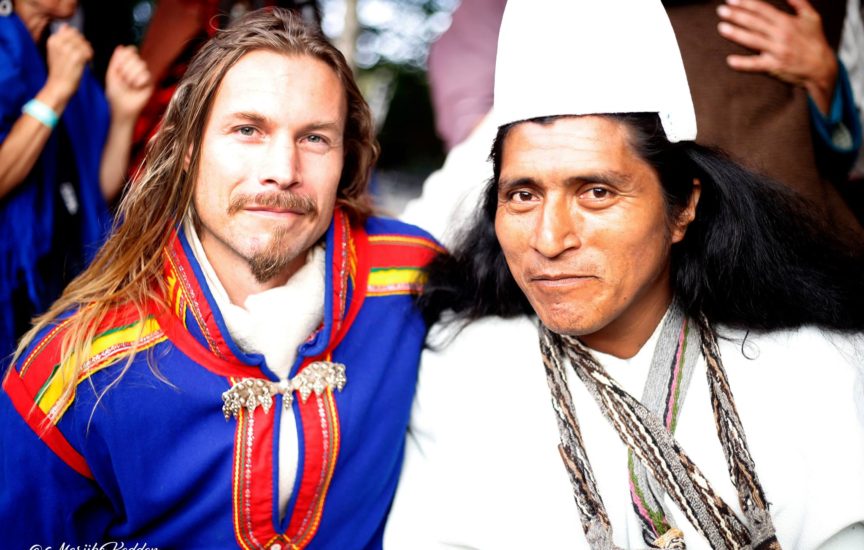WHAT DO INDIGENOUS PEOPLE HAVE IN COMMON?

 You are Reading..
You are Reading..
WHAT DO INDIGENOUS PEOPLE HAVE IN COMMON?
Photo of Jungle Svonni and Lorenzo Seuny Izquierdo Arroyo by Marijke Kodden.
What does it mean to be Sámi, or indigenous in any tribe for that matter?
Well, the other day I sat digesting my dinner at a restaurant in Tromsø North Norway and North Sápmi when a Inuit from Greenland shows up and starts talking to me. He had just reached shore together with his younger brother. But why start to talk with me? Well he thought he was in Norway, and had no concept of Sápmi. But he said he instinctively just knew that I was a hunter with some sort of shamanic background. Which is true and I recognised the same thing in his aura.
The same thing happened to me before when I was in South America, in the Amazon, although it’s not really my environment, but natives always recognize other natives, just in their way of walking, or something like that… Just the fact that you are used to walk on unlevelled earth instead of asphalt is something that shows pretty fast. Now we do know that this doesn’t come only from genetics. It comes from the way you live. One of my greatest teachers was not born Sámi, he married a Sámi woman and adopted our life style. But he was more indigenous in his ways than many people born indigenous. And taught me a lot about reading animals and the nature.
So what does it mean to be indigenous in your ways? I guess it’s nothing that you can really mesure. But it is something. I find that city people are more prone to complain about things and people. In the artificial world of cities there is always someone to blame if something doesn’t work. If something doesn’t go as planned, then someone has done something wrong. In nature there is never anyone to blame. The lakes freeze when they freeze. The snow gets as deep as it gets. You just have to find your peace with that and expect it. An animal – dog or reindeer can never understand human stress, just the current reality around them. Something that you as a human can facilitate if you can and want. This is where our gákti (the sami peoples colourful clothing) for example comes in. We dress beautifully to honour the reindeers. And there is also a harshness among us, as in the nature. This is what makes one native trust another native.
Elin tells this event made her realize she had been living in the city for too long:
“I am walking in the forrest in Alta – North of Norway, and I am taking my phone out to take a picture of the beautiful snow on the trees. Unfortunatly my fancy iPhone is not made for minus degrees and the battery turned flat, and the screen went black after a few minutes, and I am left unable to take any pictures for my social media accounts. I get angry and think : What a shitty phone! This is really a crap one, I will go to the shop and complain, and demand to get a new one.” Then I realise what is happening! I have spent too much time in the way of thinking that everything has to go according to plan and work out perfect, and and go smoothly all the time – or else it is not good enough. My mother or father would never react that way. They would simply say: “Oh, how nice! Now I get to enjoy this forrest in peace, and I don’t have to think about taking photos.”
We would say that what makes indigenous people indigenous is their connection to the nature they live in. If there is no connection to the nature, you might as well live anywhere in the universe. Native people know how the nature surrounding them functions and works, they know every tree and every plant and what grows, and what does not grow there. The native people know how to use, give back and exchange with the nature they live in. The meaning of the word “indigenous” as simply “the people who came there first” does not cut it for us. Native people are protectors of the land – wherever you live or wherever you came from, and whatever your tribe is called.
We know now that the Sami people are officially the indigenous people of the Barents-region/ arctic Europe. But are we loosing sense of what it means to be native, what is means to be Sami? How can we contribute to the western society ? Who are we, really, – today? And who did we use to be?
